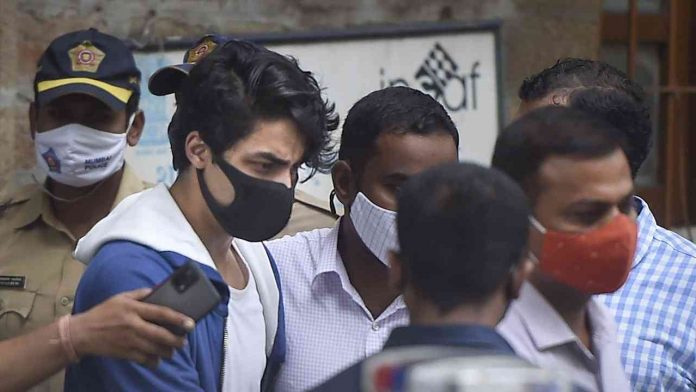This article is authored by Akash Krishnan, a law student from ICFAI Law School, Hyderabad. It discusses in detail the issues with the rejection of bail applications of Aryan Khan by the Sessions’ Court and the subsequent order of the Bombay High Court confirming the bail.
Table of Contents
Introduction
The son of Bollywood superstar Shah Rukh Khan was finally granted bail after 25 days in prison by the Bombay High Court on 29th October 2021. Over these 25 days, two bail applications that were filed by Aryan Khan to the Sessions Court and the NDPS Special Court were rejected on different grounds. The question that arises herein is that if the Bombay High Court found it appropriate to grant bail to Aryan Khan, what were the grounds on which his bail applications were rejected by the Sessions Court and the NDPS Special Court and whether these orders suffered from any irregularities.
While dealing with a case of bail, one must always remember the principle laid down by the Supreme Court in the case of State Of Rajasthan, Jaipur vs Balchand @ Baliay (1977) that bail is a rule and jail is an exception. In light of the same, this article analyses the grounds on which bail was rejected by the lower courts and the findings of the Bombay High Court in this regard.
The Aryan Khan Bail Saga
On 3rd October 2021, Aryan Khan along with Munmun Dhamecha and Aryan’s friend Arbaaz Merchant were arrested by the Narcotics Control Bureau on an international cruise off the coast of Mumbai. On October 7th 2021, the Magistrate’s Court sent Aryan Khan and the other two accused to Judicial Custody. From then on, an array of lawyers representing Aryan Khan had filed bail applications for his release. The first bail application was filed in the Sessions Court on October 8th 2021 which was rejected on the ground that the Court does have jurisdiction and therefore, it was held that the bail application was not maintainable. The reason provided for the same by the Sessions Court was that Aryan Khan and the two other accused were arrested for the offences defined under the NDPS act and therefore only a Special Court would have the jurisdiction to hear a petition for bail.
Section 36A(1)(a) of the Narcotic Drug and Psychotropic Substance Act 1985 states that any offence under the NDPS Act which is punishable with imprisonment for a term amounting to more than 3 years shall be tried by a Special Court constituted for a specific area in which the offence has been committed.
Therefore, the lawyer of all the three accused moved to the NDPS Special Court. However, on October 20, 2021, the bail application was rejected based on the voluntary statement and WhatsApp chats submitted by the NCB officials. Finally, on October 28th, 2021 the Bombay High Court granted bail to Aryan Khan on account of lack of complete evidence.
In this article, we will discuss two aspects of the Aryan Khan bail saga
- Grounds on which the Special Court rejected the bail application of the three accused
- Evidentiary irregularities which the Special Court was unable to find and the corresponding order of the Bombay High Court.
Rejection of bail by the NDPS Special Court
The lawyers of the three accused filed a bail application which was rejected by the NDPS Special Court on October 20th, 2021. The bail was rejected on the following grounds:
- The NCB officials have stated that there were no drugs found on Aryan Khan but his friend and another accused in this case Arbaaz Merchant was carrying contrabands. These allegations were voluntarily accepted by all the three accused that those contrabands were for their consumption. The Special Court in his views stated that although Aryan Khan was not in the possession of drugs at the time of arrest he surely knew that his friend had the drugs. Since he had knowledge of the presence of drugs in the possession of the third accused and had intended to consume it later, then such knowledge will be deemed to be equal to having the possession of contraband with all the people who knew about it.
- The NCB officials pressed on the part that even if there was less amount of drugs in the possession of the three accused, based on the WhatsApp chats recovered from the phones of the three accused and the statement made by the accused at the time of the arrest by the NCB officials, there is a prima facie evidence that Aryan Khan was part of the conspiracy and he had a connection to the relevant case. This argument made by the NCB was accepted by the Special Court.
- The Special Court also accepted the argument that Aryan Khan being the son of very famous celebrity Shah Rukh Khan, has a heavy influence and can tamper with the evidence given his position.
- The prosecution also argued that given their WhatsApp chat it was clear that the three accused had used illegal drugs regularly and if set free they can again resort to using drugs. This was also accepted by the Special Court.
Sections of NDPS Act under which Aryan Khan and the three other accused were booked
Section 8(c) of the NDPS Act
Section 8(c) of the NDPS Act states that nobody shall be involved in production, manufacturing, possessing, selling, purchasing, transporting, using, consuming, or importing/exporting any narcotic drug or psychotropic substance. Except if such substances are used for medical or scientific purposes.
Section 20(b) of the NDPS Act
Section 20(b) of NDPS Act States that whoever is involved in the production, manufacturing, possessing, selling, purchasing, transporting, using, consuming, or importing/exporting of any narcotic drug or psychotropic substance shall be punished with rigorous imprisonment which may extend to 10 years and fine which may extend to one lakh rupees. In case if there is a small quantity in possession then he/she shall be punished with imprisonment which may extend to 6 months and a fine extending to ten thousand rupees. If the involvement is for a commercial quantity, then the imprisonment shall not be less than ten years and can extend to twenty years and a fine which may extend to two lakh rupees.
Section 27 of the the NDPS Act
Section 27 of the NDPS Act states that if someone consumes any narcotic or psychotropic substance, then he shall be punished with rigorous imprisonment which may extend to one year and a fine which may extend to twenty thousand rupees. If there is a consumption of a narcotic drug or psychotropic substance other than substances provided under the Act, then the person shall be punished with imprisonment which may extend to six months and a fine extending to ten thousand rupees.
Section 35 of the NDPS Act
Section 35 of the NDPS Act states that it is presumed that the accused knew what they were doing. Hence, until the accused is proven guilty, he will be deemed to be innocent.
In any prosecution for an offence under this Act which requires a culpable mental state of the accused, the Court shall presume the existence of such mental state but it shall be a defence for the accused to prove the fact that he had no such mental state concerning the act charged as an offence in that prosecution.
Evidentiary irregularities in bail order of Special Court
The Special Court denied the bail application of Aryan Khan and the other three accused basically on the two grounds that there was a voluntary statement made by the accused under Section 67 of NDPS Act and the WhatsApp chats wherein it was found that the accused had several contacts with drug peddlers in India and abroad.
This order of the Special Court was heavily criticized as it has not followed the established principles and precedents of law. The following part lays down some grounds where the court’s order lacked evidentiary value
Placing reliance on the voluntary statement of accused given to NCB officials
The Special court while pronouncing its order concurred on the statement made by the accused to the NCB officials. While pronouncing the order no reliance was made on the principle that was established in Tofan Singh vs State of Tamil Nadu (2013), where the Supreme Court held that NCB officials are not more than a police officer and any statement or confession made to them during interrogation or arrest are not admissible in the court of law. Section 25 of the Evidence Act 1872 also provides that the statement made to police officers is inadmissible in the court of law.
This can further be inferred from the case of Shivaraj Urs vs Union Of India (2020) where the accused was prosecuted for an offence under the NDPS Act and NCB officials were relying on the voluntary statement of the accused. The Karnataka High Court relied on Toofan Singh’s case and allowed bail for the accused.
Therefore, in light of Section 25 of the Indian Evidence Act and the cited precedents, the Special Court should not have admitted the voluntary statement made by the accused to NCB officials and should have granted the bail.
Questioning the evidentiary value of WhatsApp chat
While rejecting the bail application, the Special Court also relied on WhatsApp chats and the involvement of the accused in conspiracy with other entities who are accused of an offence under the NDPS Act. It is noted that WhatsApp chats are included as electronic evidence and shall be admissible only if a certificate is attached as per Section 65B of the Indian Evidence Act. This is to certify that the secondary evidence, so presented, is generated from a computer and is not manipulated evidence.
This can be further supported by the cases of Arjun Panditrao Khotkar vs Kailas Kishanrao Gorantyal (2020) and P.V. vs P.K. Basheer (2014) wherein the Court has held that secondary evidence submitted without a certificate is inadmissible as provided under Section 65B of the Indian Evidence Act 1872
The ambit of attaching a certificate with secondary evidence was explained in depth in the case of Rakesh Kumar Singla vs Union of India (2020) wherein the Court held that it is mandatory to attach a certificate with secondary evidence even in the bail application
In the Aryan Khan case, the Court directly relied on the WhatsApp chat submitted by the NCB without any certificate. This shows that the Special Court has not concurred with the precedents and the provisions of the Indian Evidence Act.
Special Court wrongfully constructed offence of conspiracy against Aryan Khan
The term conspiracy is not defined under the NDPS Act. According to Section 120A of the Indian Penal Code conspiracy means when two or more individuals consent to do/participate or have done/participated in an illegal act or any legal act with illegal means then they have said to commit criminal conspiracy.
Essential of criminal conspiracy
- There must be a common intention
- To do or participate in any illegal act
- To do or participate in a legal act that is done by illegal means
In Aryan Khan’s case, the Court relied on WhatsApp chat which does not have any evidentiary value and was of the view that the accused has links with drug dealers. The Court concluded that as the chats show his contact with peddlers and suppliers for drugs and in his interrogation he has named some peddlers, he is part of a conspiracy.
The Court while making its conclusion crossed the ambit of the definition of conspiracy. The NDPS Act does not define conspiracy. The Indian Penal Code defines conspiracy which states there shall be involvement and common intention to commit any illegal activity. The NDPS Act gives punishment for the commission of criminal conspiracy under Section 29 of the Act. But the interpretation of section 29 of the NDPS Act is different when it gives punishment for criminal conspiracy. Section 29 of the NDPS Act states that a person shall be punished if he/she abets or becomes a party to criminal conspiracy under this Act.
The Court drew its conclusion by considering the past actions of the accused, i.e., the Whatsapp chats of Aryan Khan with alleged drug dealers/peddlers. This constitutes negligence on the part of the Court as the past actions cannot be connected to the present offence until and unless the two events are connected and all the accused know about the conspiracy. In the Aryan Khan case, all the past actions constitute a separate offence and cannot be attached to the present case.
To prove that there is an existence of criminal conspiracy it needs to be shown that there is a common intention in parting with the criminal conspiracy which the Special Court was unable to construct. To prove that there was a criminal conspiracy on part of Aryan khan the Special court relied upon the case of Showik Chakraborty vs Union of India (2020) for assisting Section 29 of the NDPS Act. The Court was of the view that the cited case is a similar case to the Aryan Khan case therefore Section 29 can be invoked. But in the Showik case, there was a connection of the accused with the drug peddler who was found in possession of the illegal narcotic drugs in commercial quantity. However, in the case of Aryan Khan, the Court was unable to find any connection between the co-accused who was found to be in possession of drugs in a commercial quantity.
Conclusion
Rejecting bail by omitting an established legal provision and precedents is not what citizens of India expect from Courts. Law is equal for everyone and everyone should be treated accordingly. But in the name of justice, a Court cannot directly believe and admit the charges levied by an administrative body like the NCB. A court should look and consider the facts of the case and because this was not done, the provisions of the NDPS Act were misinterpreted by the Court and several binding precedents were also ignored.
This shows a negative attitude on part of the judiciary which was slammed by many jurists and even by the Bombay High Court. Therefore it is important that the judiciary learns from this case and ensure that such situations do not arise in the future.
References
- https://www.hindustantimes.com/india-news/aryan-khan-case-timeline-from-october-3-30-what-happened-in-27-days-101635600663160.html
- https://www.indiatoday.in/india/story/aryan-khan-granted-bail-drugs-case-bombay-high-court-ncb-1870587-2021-10-28
- https://www.indiatvnews.com/news/india/bombay-high-court-granted-bail-to-shahrukh-khan-son-aryan-khan-aaj-ki-baat-episode-october-28-rajat-sharma-blogpost-742747
- https://scroll.in/article/1008279/why-has-aryan-khan-failed-to-get-bail-despite-no-drugs-being-found-on-him
- https://www.indiatoday.in/india/story/mumbai-aryan-khan-booked-under-4-sections-of-ndps-act-what-do-they-mean-1860276-2021-10-03
Students of Lawsikho courses regularly produce writing assignments and work on practical exercises as a part of their coursework and develop themselves in real-life practical skills.
LawSikho has created a telegram group for exchanging legal knowledge, referrals, and various opportunities. You can click on this link and join:
https://t.me/joinchat/L9vr7LmS9pJjYTQ9
Follow us on Instagram and subscribe to our YouTube channel for more amazing legal content.
 Serato DJ Crack 2025Serato DJ PRO Crack
Serato DJ Crack 2025Serato DJ PRO Crack











 Allow notifications
Allow notifications


